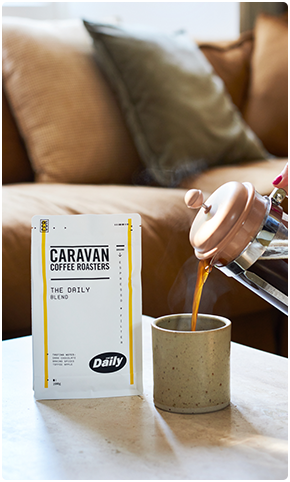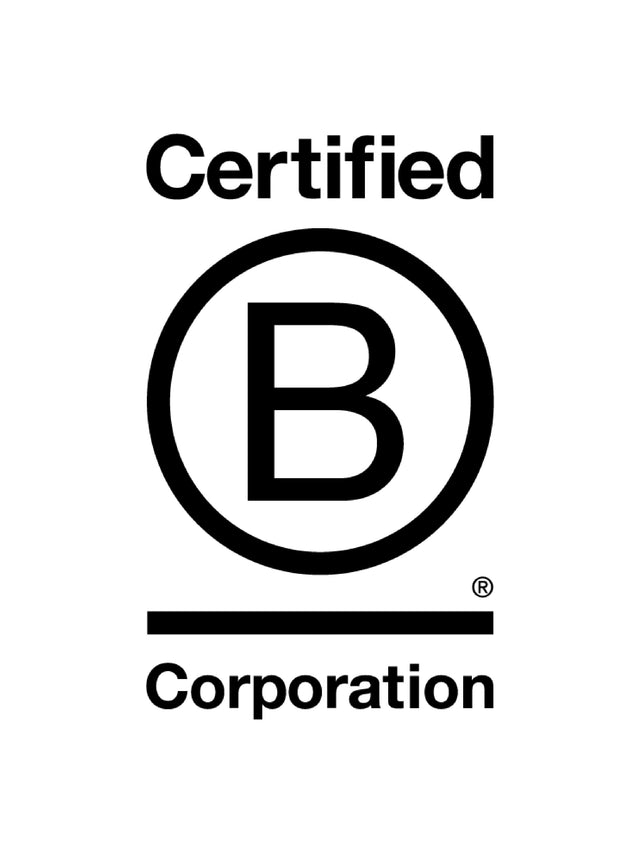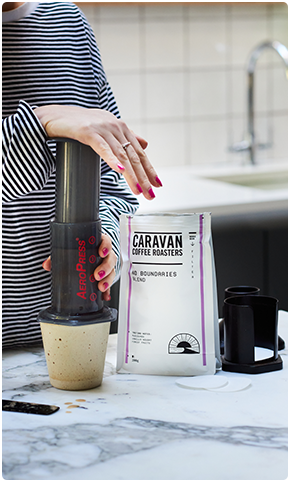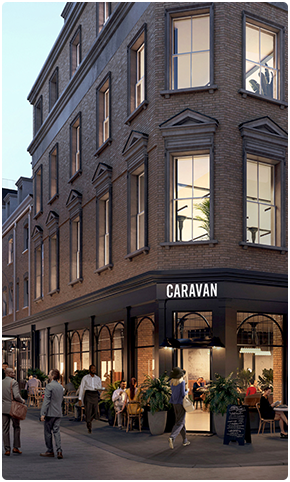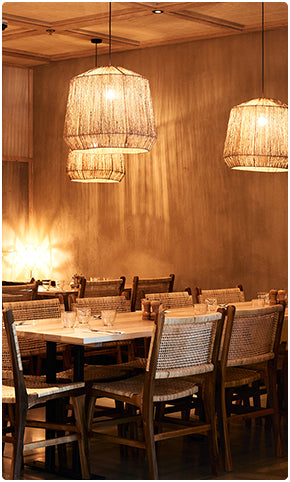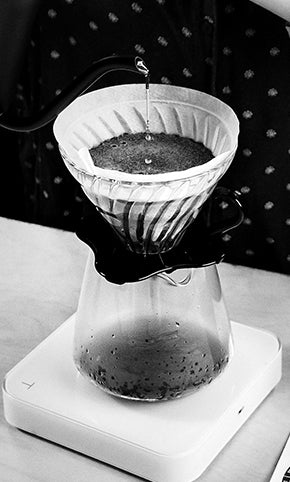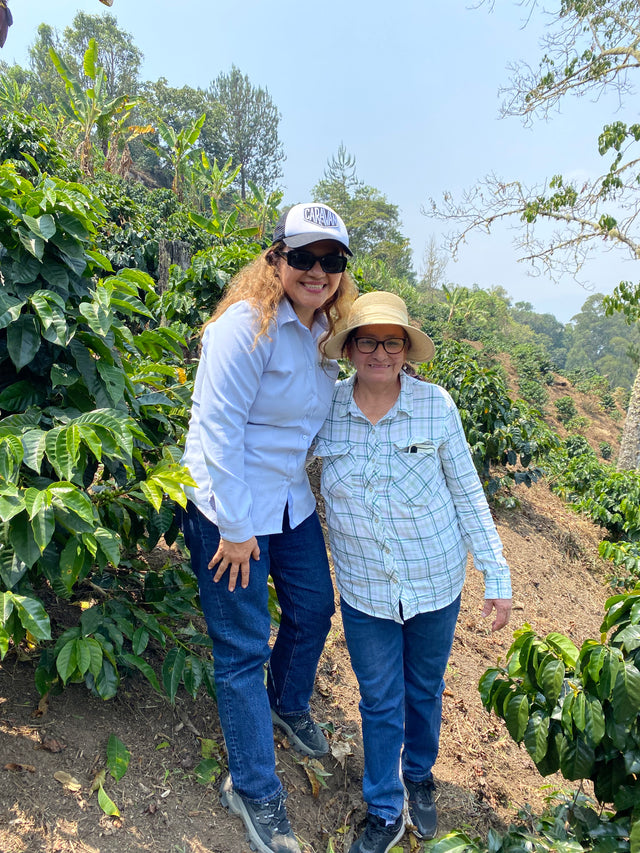Xmas bru
Want to recreate the Caravan experience at home? Check out our recipe book, Caravan: Dining All Day.
Xmas bru
-
Region
Kirinci; San Ignacio; Huila
-
Producer Groups
Barokah Cooperative; COOPAFSI; El Carmen Association
-
Harvest Period
April to October
-
Average Farm Size
<1 to 3 Hectares
-
Process
Natural; Washed; Washed
|
This fall at Lambworks, the repurposed Victorian-era warehouse which we call home, our sourcing and quality teams spent the better part of autumn dreaming up the perfect festive blend. There is a lot that goes into blending besides the physical task – each component must bring a certain unique flavour, texture, or aroma to the blend. Our Head of Coffee curated this year's blend with the support of three producer groups who grew these coffees - all of whom represent smallholder farmers in their respective regions. Their coffees were grown in the summer and autumn of this year, arriving just in time to our roastery in order to achieve peak freshness and best flavour. The top notes of fruit in this blend comes from a naturally processed Sumatran coffee from the Koerintji Barokah Bersama Cooperative, or just Barokah for short. This small cooperative of 320 members is located on the slopes of Mount Kirinci, one of the many volcanos that comprise the famous Pacific Ring of Fire, a horseshoe-shaped band of volcanic activity which is responsible for near-constant eruptions across the Asian Pacific region. Barokah is an exceptional cooperative. In 2017, their first year as an organization, they took first place at the Indonesian Specialty Coffee Contest, and second the year after. The cooperative’s manager is a young farmer by the name of Triyono, who has become an inspiration for young people in coffee who are looking to become more innovative and sustainable in their farming practices. To support their members, Barokah focuses on a number of areas of improvement, ranging from processing practices to sustainable cultivation methods, increasing business knowledge and market access. Barokah has nine collection centres that are owned by the cooperative, where local members deliver their cherry to be processed and dried before being moved to the coop’s central mill. This lot was processed using the natural method, uncommon for Sumatra. Traditionally Sumatran coffees are known for being earthy, even defective, however this lot was carefully managed throughout the post-harvest journey, drying under domes which protect it from rain or harsh sunlight. This protection is essential in Sumatra, where unpredictable rain and constant humidity make processing risky and difficult. The second component in this year’s Xmas Brü, providing the rich chocolate notes, comes from a place very distant from the islands of Indonesia - the highlands of Northern Peru. The region of San Ignacio, where the Cooperativa Agraria Frontera San Ignacio (COOPAFSI for short) is located, is known as the heart of the coffee growing industry in Peru. Our Head of Coffee visited the region in 2019, where the area’s remarkable natural beauty and the incredible warmth of the local people left an indelible impression. Farms in San Ignacio are tiny and often extremely remote, meaning the job of local cooperatives in this region is crucial in order to support the successful collection and export of hundreds of farmer’s coffees. This lot was named ‘Gallito de las Rocas’ after the flashy, bright red birds of the same name that hide in the trees around the coffee growing areas. The 330 farmers of COOPAFSI grow traditional varietals of Typica and Bourbon as well as the more modern Caturra plant. All three varietals are known for exceptional quality, helped along by the rich soils and stunning altitudes of the Andean heights. This coffee was processed using the washed method at each farmer’s home. It is common for farmers in this region to build fermentation tanks out of fallen romerillo trees, which they believe do a better job of regulating temperatures in the tanks than concrete or tiles. Our final component to this year’s blend, contributing its sweet, nutty base notes, comes from our good friends at the El Carmen Association in Colombia. If you’ve been following CCR for a while, you’ll have heard the name El Carmen many times before, as they have been a partner of ours for a number of years. El Carmen were the first members of the Red Associations, a project set up by the social enterprise importer Raw Material, who we’ve been working with since 2014. At the time of the Red Association project’s inception, the producers in the area identified that unstable market prices and the low quality of their coffee were causing incomes to drop to unsustainable levels for most farmers, prompting many to leave coffee and their communities altogether. To combat these issues, the Red Associations provides producers with infrastructure, technical support, and market access, as well as a guaranteed fixed price for their coffee which has grown average incomes for members by 2.5 times. There are many reasons to celebrate this project's success, as say the many happy drinkers of this delicious brew! --- The events of 2020 have forced many of us to feel further away from each other than ever before. With no ability to travel to origin for our sourcing team and less market security for producers and their families, the coffee industry across the globe has struggled to adapt to the new reality. However, we at Caravan know that through all of it, the most important work that we do starts with relationships – with people, their homes, and their stories. We are excited as ever to be part of this community, and we hope you’ll help us celebrate the holidays by sharing in a cup of coffee - something that brings us that little bit closer together, even when we're far apart. |
BREWING GUIDE
Xmas Brü was crafted for versatility and ease of brewing – one less thing to worry about over the holidays! For filter, we recommend using a ratio of 60 grams of ground coffee per litre of boiled, filtered water, adjusted for size. If you like it slightly stronger, just add an extra gram or two. For espresso, we recommend a dose of 18 grams, to a liquid yield of 40 grams, aiming for a total extraction time of 30-32 seconds.

